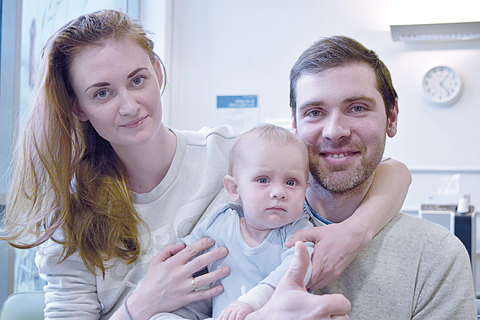 Baby Vitaly and family
Baby Vitaly and familyKUWAIT: A Russian baby, Vitaly, has been given a new lease of life after being treated for an extremely rare condition called Prune Belly Syndrome at Great Ormond Street Hospital for Children in London (GOSH). Vitaly suffers from an extremely rare condition called Prune Belly Syndrome and has been in and out of hospital since birth. Vitaly's parents first knew something was wrong at a routine ultrasound in Russia at 13 weeks, where doctors originally diagnosed with Vitaly with megacystis. However, when Vitaly was born, it was evident that his condition was a lot more serious than was first expected.
Vitaly was diagnosed with a rare condition called Prune Belly Syndrome, a condition that affects around 1 in 40,000 births.
Professor Imran Mushtaq, Consultant Paediatric Urologist at GOSH, who treated Vitaly explains that Prune Belly Syndrome is a very rare condition. "The muscle of the tummy (the abdominal wall)is very thin and children also have very weak, very abnormal and often dilated kidneys. The bladder is also very distended and doesn't work very well. The condition has three main symptoms; abnormal urinary syndrome, abnormal abdominal wall and their testicles are inside the tummy and have not descended. And that's why some people call it the Triad Syndrome," explains Professor Mushtaq.
As the condition was so rare, doctors in Russia were unable to provide the expertise necessary to help Vitaly, so his mother Lidia started to research for treatment. In search of expert treatment to help him, his family travelled to Great Ormond Street Hospital for Children (GOSH) in London. "I tried to get in touch with other mothers who had children with similar conditions on the internet, and that's how I found out about Anglomedical and Professor Mushtaq at GOSH," Lidia explains. Before arriving at GOSH, the family worked with Anglomedical, a medical concierge based in the UK, who helped them liaise with GOSH and prepare to come to the UK.
"Initially when Vitaly arrived he was in a very poor condition,"Professor Mushtaq says. "He was very weak and had a poor kidney situation. And that's where Dr Stephen Marks has been amazing. He has worked really hard to improve the nutritional status, to improve the kidney function and he got us to the stage where we could we could carry out a simple procedure."
'Our doctors have done everything'
Dr Stephen Marks, Consultant Paediatric Nephrologist at GOSH, was the lead medical physician and kidney specialist overseeing Vitaly's care. "I instituted medical management to improve his electrolyte imbalance with additional supplements, phosphate binders, activated vitamin D and treatment of his anaemic of chronic disease," Dr Marks explains. "I coordinated the multidisciplinary team input with dietetic, urology, general surgery, dermatology and respiratory reviews."
Vitaly was given a gastrostomy to improve his nutritional input and growth at GOSH. Professor Mushtaq also performed a vesicostomy operation on Vitaly's bladder to make an opening in the bladder so the urine drains straight out into the nappy. Since these operations, his condition has improved significantly. "Our doctors have done everything for our child. They have saved the life of our child," Vitaly's dad explains.
"Everyone was telling us how Professor Mushtaq treats all his patients like they are his own children before we came," Lidia explains. "When we arrived, we saw how true that was; it's how he communicates with Vitaly, how he holds him, how they have a laugh together. There is so much warmth and so much love in what he does, so it's not only this amazing professional world-class expertise but it's also his relationship which makes parents so calm and comfortable in this difficult situation. Thank you from all the parents in Russia you've helped."
Vitaly will have to return to GOSH regularly for check-ups and will soon need a kidney transplant, as well as further surgery to reconstruct the bladder. "We treat children from all over the world with rare urological and kidney conditions. I consider it our responsibility to use our expertise to try our best to benefit every child not only in the UK but around the world" Professor Mushtaq concludes. GOSH's urology service treated 92 patients from the Middle East last year, including 19 children from the UAE and 42 children from Kuwait.










